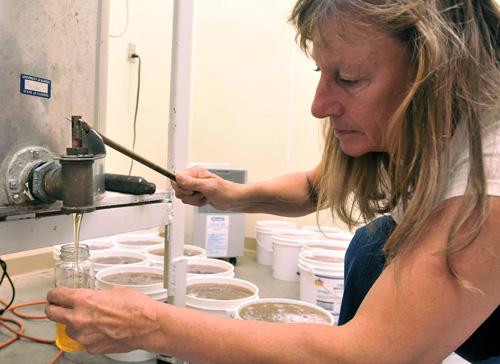Honey’s health benefits prove to be sweet deal

Bee researcher Karen Pruitt fills a container with honey at the Bee Research Facility on Friday morning. The facility, for all of its work in studying bees, does get a bit of payback in the form of a soybean-clover honey, which is often given out to faculty members. Wesley Fane
February 24, 2009
Two common worries among Americans today include how to save money within this difficult economy, and how to eat healthily. Nicki Engeseth, professor in Food, Science and Human Nutrition at the University, may have found solutions to both of these problems.
Engeseth recently conducted a study which found the antioxidants in honey helped preserve salad dressings for up to nine months, while naturally sweetening the taste.
“Honey is good for you,” said Karen Pruitt, a bee research specialist at the University bee lab. “It is one of the few sweeteners that have nutritional value.”
Pruitt said fermented honey existed even before people had power in their homes and was used in many products such as alcohol and candles. She feels honey is still a valued product in today’s society because people are interested in eating more organic foods and honey is most simply made from the nectar of flowers.
“The main benefit of using honey in salad dressings would be for the antioxidants it contains,” said Carol Shriver, a dietician and regional nutrition manager for Provena hospital.
Get The Daily Illini in your inbox!
Shriver said antioxidants may help fight off diseases and can cause a person to have more energy if enough are consumed.
“A lot of times with salad dressings, the manufacturers use unhealthy preservatives like sodium,” Shriver said. “When they add honey, they can use it instead of other preservatives.”
Shriver added that a lot of sugars within products such as salad dressings are due to the manufacturer’s use of high fructose corn syrup, which is responsible for many of the calories in sweeter foods.
Although honey has the same nutritional value as some other sugars, Shriver said she believes honey is superior due to the antioxidants it contains.
“Americans shouldn’t think honey doesn’t have carbohydrates,” Shriver said. “It has as many calories as other sweeteners, but with more health benefits.”
Pruitt said if honey were to be used more often in salad dressings, the manufacturers should also consider which kind of honey they plan to use.
“The type of honey you get is distinctive to where you are,” Pruitt said. “There’s black locust honey, soybean honey and buckwheat honey, which has the most antioxidants.”
Shriver said manufacturers should try to use buckwheat honey in salad dressings, but most end up just using other kinds which contain fewer antioxidants and therefore a shorter shelf life.
“Honey can be used in salad dressings, skin creams, hair conditioners, on toast and in tea,” said Emil Blobaum, a beekeeper in Champaign. “Honey also makes things last longer so people can store those products in their homes for months at a time.”
Blobaum and Pruitt both harvest and sell the honey they produce. However, over the past 15 years, beekeeping has become a difficult career path because as Pruitt said, the price of honey went down and therefore there has been less interest in the profession.
“In a way, I don’t think that the United States is producing as much honey as we need to,” Blobaum said. “Manufacturers ought to increase the use of honey in their products.”






